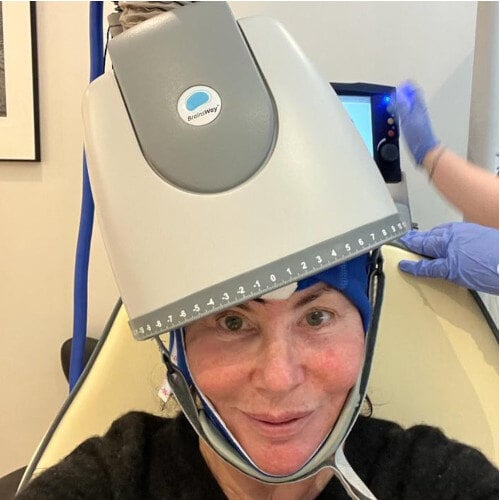Ruby Wax used Instagram to reveal how TMS worked for her – and highlight the lack of funding for mental health care
July 19, 2022 - Smart TMS

Repetitive transcranial magnetic stimulation rTMS does not get much press coverage. Nor does it feature on Instagram often, so thank you to Ruby Wax for using this platform to talk about her recent TMS treatment.
Why does this matter? Because, as Ruby found, Transcranial Magnetic Stimulation is very effective at treating depression. She joins countless others who have benefited from the non-invasive treatment. TMS stimulates the repair of “damaged” circuits so alleviating depression and allowing a return to normal life.
Ruby said:
“I’m better now but the pulling out of the quicksand of depression is so slow, it’s faster to watch your hair grow.
Last time this happened to me about twelve years ago, it took months to return to who I used to be, this time, it took only weeks.
Here’s how I pulled out of being part of the walking dead, there’s a new piece of machinery called rTMS (repetitive transcranial magnetic stimulation).
If you would have told me five years ago something like it existed, I’d think you had watched too much sci-fi.”
As she highlights, TMS does work fast, giving a quick recovery for many patients. It has in fact been around for much longer than five years. It was approved by NICE in 2015 and has been widely used in the US since FDA approval in 2008. However, it still remains not very well known in the UK, nor is it widely available on the NHS. Both things that we are working to remedy!
Ruby continues:
“The repetitive transcranial magnetic stimulator doesn’t use electricity. It uses a magnetic pulse that whacks your neurons into action, like rebooting a stalled car.
Works on 60% of patients with depression, OCD and a few other mental disorders and thank you Jesus, I was in that 60%.”
She then finished with a plea for increased availability of TMS treatment and attacked the poor levels of funding for mental healthcare within the NHS.
“There are only a handful of places in the UK that offer treatment using this piece of equipment because mental illness is probably lowest on the list when it comes to taking disease seriously.
To me it’s actually the most serious because a sick brain is usually the underlying cause of most physical diseases.
But we know about the stigma blah blah blah.. and not enough is being done about it.
That’s why with mental illness, forget getting the right help, forget getting the right meds, forget a bed in a hospital, forget seeing a psychiatrist so really why would they bother making this magical piece of equipment available to the measly 1 in 4?
I will continue to fight the fight.”
It is very encouraging that an experienced mental health professional and campaigner, like Ruby Wax, is now flying the flag for TMS. Thank you, Ruby, we wish you well.
Image Credit: Ruby Wax Instagram, https://www.instagram.com/rubywax/










